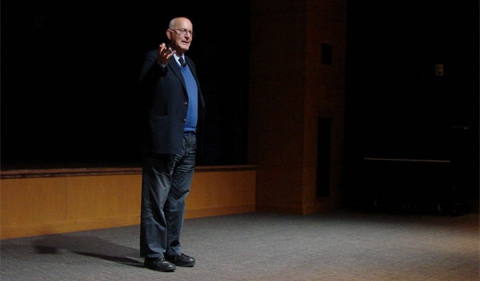Brexit is a heated topic both in the United Kingdom and abroad. But since, as Dr. Jeremy Black reminded the Ohio University audience, “academics do not necessarily know more than anyone else on current events,” his talk focused not on his personal opinions of Britain leaving the European Union, but on the historical events leading up to 2016 referendum.
Ohio University’s Contemporary History Institute and the George Washington Forum hosted the well-known British military and international historian on Nov. 4.
Black began with the formation of the European Economic Community (EEC) in the decades after World War II, which Britain did not join until 1973. Even then, however, both factions on the political left and right opposed entry for different reasons.
Certainly, Britain had a far more hands-off relationship with the EU than other members. For example, the UK chose not to join the Euro and remained wary of protecting Britain’s economy and sovereignty.
The 2008 financial crisis exacerbated these tensions as did the EU’s insistence on closer economic ties. Having seen two other referendums fail, Prime Minister David Cameron gambled that this vote would as well and held a referendum to silence the issue.
The rest is history.
Black concluded his talk by listing a few major points: First, he believes it is too easy to say the events of 2016 are connected since this does not take into account national differences. Second, both sides in British politics share a common “instrumentalist” approach to politics promising to solve their constituents’ problems in exchange for votes.
Likewise, both sides ignore the fact that there were good and bad reasons to stay in the EU and there will be good and bad consequences of leaving. Next, he asked the audience to remember that there were many people who were on neither side of the issue. Also, when historians examine why people voted for the referendum it must be set in the context of the time and events that it took place.
Finally, Black emphasized that Britain has fundamental problems that have nothing to do with Brexit. He argued that long-term issues of debt and recent constitutional changes were more worrying matters.
As for the current problems on getting an exit deal, he added, “People get the politicians they deserve.” But he also concluded on a more hopeful note. Both American and Britain have had much more divided and trying times compared to the events of today.
“For most of my life,” he added, “people would have given their right arm for the unemployment rates of today.”
Black is the author of more than 100 books, including English Nationalism: A Short History and a professor of history at the University of Exeter. Professor Black’s talk was titled: “Brexit in Historical Perspective,” and was hosted by the Contemporary History Institute and the George Washington Forum.




















Comments